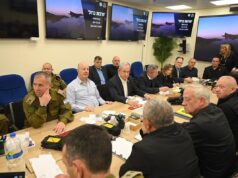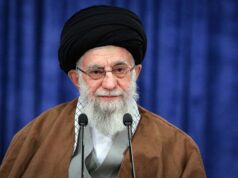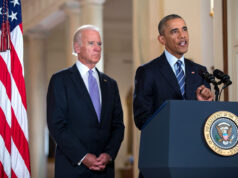After nearly a month of stalled fighting, Iraqi forces regained control over much of Tikrit on Tuesday, displacing Islamic State militants who had captured the city last June. During their fight to take back the city, about 80 miles northwest of Baghdad, the Iraqi government revealed an important, yet controversial part of their strategy–Popular Mobilization Units (PMU).
Iraq’s Prime Minister Haider al-Abadi announced Tikrit’s liberation on state tv, hailing it as the first major victory following the Islamic State’s expansion into western Iraq last summer. In the end, about 4,000 Iraqi soldiers were confronted by only a few hundred IS loyalists, meaning the terrorist group was outnumbered almost 10 to 1.

Members of the Hashid Shaabi forces, which allied with Iraqi forces, chant slogans against the Islamic State in Tikrit. (Photo: Reuters) |
According to reporters embedded with the Iraqi military, some street-to-street fighting in Tikrit remains with Iraqi troops and their militia allies still facing pockets of resistance. Advancing forces also face the threat of hidden improvised explosive devices (IED) and booby-traps, but government forces were able to enter provincial government buildings and the town’s presidential palace.
Baghdad’s victory comes at a price with new tensions between its two larger allies, the U.S. and Iran. Earlier this month, Iraqi forces launched the Tikrit offensive with the backing of the PMUs but against the recommendation of U.S. advisors. The initiative subsequently stalled leading the Iraqi government to ask for U.S. support. Coalition air strikes helped beat back IS fighters, but many PMU fighters felt betrayed and withdrew their fighters as well.
While Iran and the U.S. are now fighting a common enemy, the Pentagon worries that Iranian proxies are establishing a permanent zone of influence in Iraq. Shiite militias with loyalty to Tehran could thus undermine Baghdad’s authority and ultimately establish a parallel government, similar to Hezbollah in southern Lebanon.
Additionally, other Iraqi minorities voice concern about the human rights records and accountability of the Shiite militias. Following the execution of approximately 1,700 predominantly Shiite Iraqi soldiers outside Tikrit last year and other sectarian attacks at the hands of IS, many local Sunnis fear revenge attacks from the PMUs. Sunni tribal leaders already accuse the PMUs of atrocities after finding 70 civilians in mass grave in eastern Diyala province after defeating IS there.





